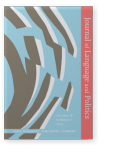Vol. 18:6 (2019) ► pp.803–825
Performing (in) places, moralizing (through) spaces
Podemos’ parliamentary performances
This paper offers an account of the co-constitutive interaction between spatial and discursive dynamics in present-day politics. I focus on Podemos, a recently established party in Spain that was able to secure 20% of votes in the 2016 general election. Building on critical geography’s political understanding of space, together with cultural and discourse studies’ insights on place representation, formulation, and embodiment, I examine Podemos’ parliamentary performances, as well as their different moral evaluations by opposing parties. Throughout my analysis, I show, first, that the transgressive nature of certain acts is intrinsically linked to the particular spatial relations enforced in institutional contexts, and second, how, in their discursive struggles over common sense, different actors consistently mobilize space as a moralizing agent. The different strategies adopted reveal a tension between dominant and emergent ways of ‘doing politics’ that parallels competing visions of the relationship, in contemporary Spain, between civic and institutional spaces.
Article outline
- 1.Introduction
- 2.From politics of space to spatial politics
- 3.Performing (in) places
- 3.1Embodying politics
- 3.2Register change
- 4.Moralizing (through) spaces
- 4.1Discussing decorum
- 5.Conclusions: Lived spaces, lived politics
- Acknowledgements
- Notes
-
References
